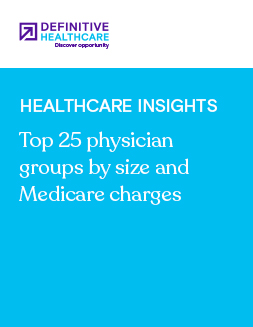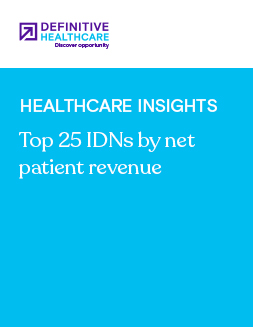Healthcare Insights
25 states with the highest total prescription drug spending
Drug spending data is crucial for strategic decision-making in the pharmaceutical industry. It can unlock insights into market dynamics, competitor positioning, and pricing strategies, empowering companies to gain a competitive edge.
By analyzing spending patterns and prescription trends, companies selling into the market can pinpoint areas with high growth potential, emerging market trends, and underserved patient populations, informing strategic opportunities.
Furthermore, drug spending data grants visibility into market dynamics across therapeutic categories, regions, and payor segments. This can help brands identify not just pricing trends and competitive benchmarks, but also opportunities to differentiate themselves in the market.
In this Healthcare Insight, we explore prescription drug spending in the United States using data from our Atlas Prescription Claims for the calendar year 2023.
| Rank | State | % of prescription drug spend | Explore dataset |
|---|---|---|---|
| 1 | Texas | 11.17% | Explore |
| 2 | California | 8.10% | Explore |
| 3 | New York | 4.40% | Explore |
| 4 | Florida | 4.01% | Explore |
| 5 | Puerto Rico | 3.85% | Explore |
| 6 | North Carolina | 3.83% | Explore |
| 7 | Ohio | 3.80% | Explore |
| 8 | Pennsylvania | 3.62% | Explore |
| 9 | Illinois | 2.94% | Explore |
| 10 | Georgia | 2.88% | Explore |
| 11 | Louisiana | 2.84% | Explore |
| 12 | Michigan | 2.63% | Explore |
| 13 | Kentucky | 2.45% | Explore |
| 14 | Tennessee | 2.23% | Explore |
| 15 | Virginia | 2.13% | Explore |
| 16 | Arkansas | 2.12% | Explore |
| 17 | Missouri | 2.09% | Explore |
| 18 | Washington | 1.90% | Explore |
| 19 | Minnesota | 1.89% | Explore |
| 20 | Indiana | 1.82% | Explore |
| 21 | Alabama | 1.79% | Explore |
| 22 | New Jersey | 1.65% | Explore |
| 23 | Arizona | 1.56% | Explore |
| 24 | South Carolina | 1.46% | Explore |
| 25 | Colorado | 1.43% | Explore |
Fig. 2 Data is from Definitive Healthcare’s Atlas Prescription Claims for PhysicianView for calendar year 2023. Accessed May 1, 2024.
Which U.S. state has the highest total prescription spending?
The U.S. state with the highest percentage of prescription drug spending was Texas, with 11.2% of prescription drug spending in 2023. California closely followed Texas with 8.1% of U.S. prescription drug spending. New York ranked third, constituting 4.4% of drug spending in 2023.
These three states—Texas, California, and New York—are among the largest states by population size in the U.S. The large population size in these states contributes to the total prescription charges, as healthcare providers in populous states tend to write more prescriptions.
Additionally, Texas, California>, and New York are home to some of the nation's top hospitals, many of which are academic medical centers or specialized cancer research centers. These hospitals are more likely to administer costly, experimental drugs to their patients, which can further drive up total prescription charges.
Overall, the combination of large population size and the presence of top-tier medical facilities likely contributes to the high total prescription spending in Texas, California, and New York.
What is the total prescription drug spending in the U.S.?
In 2021, the U.S. spent $603 billion on prescription drugs, with spending heavily driven by a relatively small number of high-cost drugs. Although generics fill 80% of prescriptions, brand-name drugs dominate spending at 80%. High-cost specialty drugs drove $301 billion in drug spending in 2021, up 43% since 2016, constituting 50% of total drug spending. The priciest 10% of drugs (less than 1% of prescriptions) account for 15% of retail spending and 20%-25% of non-retail spending.
Learn more about the most common outpatient prescription medications, most prescribed antibiotics, and most common pain medications.
Why are prescription drug prices rising in the United States?
The high cost of prescription drugs in the U.S. is a multifaceted issue driven by various factors, including research and development costs, limited competition, complex pricing mechanisms, market dynamics, regulatory policies, and inefficiencies in the healthcare system.
Drug price increases are also common in the U.S. as drugmakers may change the list prices of their drugs after launch. From January 2022 to January 2023, more than 4,200 drugs experienced price increases, with an average price increase of 15.2% or $590 per drug product.
Research and development costs
Pharmaceutical companies invest significant resources in research and development (R&D) to bring new drugs to market. The high costs associated with drug discovery, clinical trials, and regulatory approvals are often cited as drivers of increased drug prices. Additionally, the failure rate of drug development further compounds these costs.
Limited competition and patent protection
The patent system grants pharmaceutical companies exclusive rights to produce and sell their drugs for a set period. During this time, competitors are barred from producing generic versions of the drug, allowing brand-name manufacturers to maintain exclusivity. In some cases, after patents expire, pharmaceutical companies may work to delay generic entrants, interrupting inevitable price competition.
Drug rebates and discounts
The complex system of rebates and discounts negotiated between pharmaceutical manufacturers, pharmacy benefit managers (PBMs), insurers, and government programs can obscure the true cost of prescription drugs. While rebates and discounts may reduce costs for payors, they can also contribute to higher list prices for drugs, as manufacturers seek to offset the discounts provided.
Market dynamics and demand
The market dynamics of supply and demand play a significant role in determining drug prices. For drugs with limited competition or high demand, manufacturers may have greater pricing power and can set prices at levels that maximize revenue. Additionally, the increasing prevalence of chronic diseases and aging populations has led to a growing demand for certain drugs, exerting upward pressure on prices.
Regulatory and policy environment
Government regulations and policies can influence drug pricing dynamics. For example, the historic lack of price negotiation for Medicare Part D drugs and restrictions on drug importation have limited the ability of government programs to negotiate lower prices. Additionally, regulatory barriers to entry, such as lengthy approval processes and patent protections, can impede competition and contribute to higher prices.
To discover why healthcare costs are rising overall in the U.S., check out this post.
Legislators address rising prescription drug costs in the U.S.
Recognizing the impact of government regulations on drug pricing, recent legislative changes aim to address these challenges. In 2022, the Inflation Reduction Act (IRA) became law, making several changes to Medicare to lower prescription drug costs, including setting a yearly limit on what Medicare patients pay for drugs and putting a cap on insulin costs. Medicare has also begun to negotiate drug prices under the IRA, with negotiated prices for these drugs going into effect in 2026.
Learn more
Healthcare Insights are developed with healthcare commercial intelligence from the Definitive Healthcare platform. Want even more insights? Start a free trial now and get access to the latest healthcare commercial intelligence on hospitals, physicians, and other healthcare providers.


